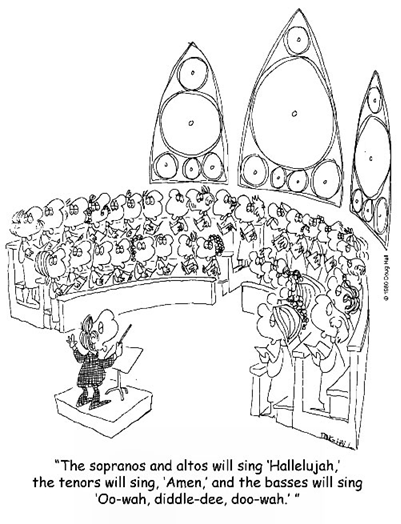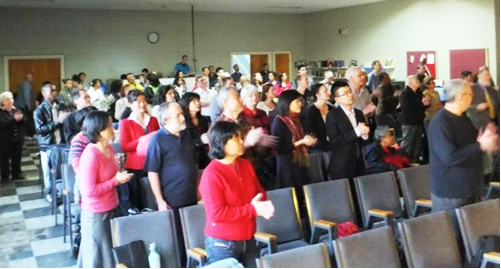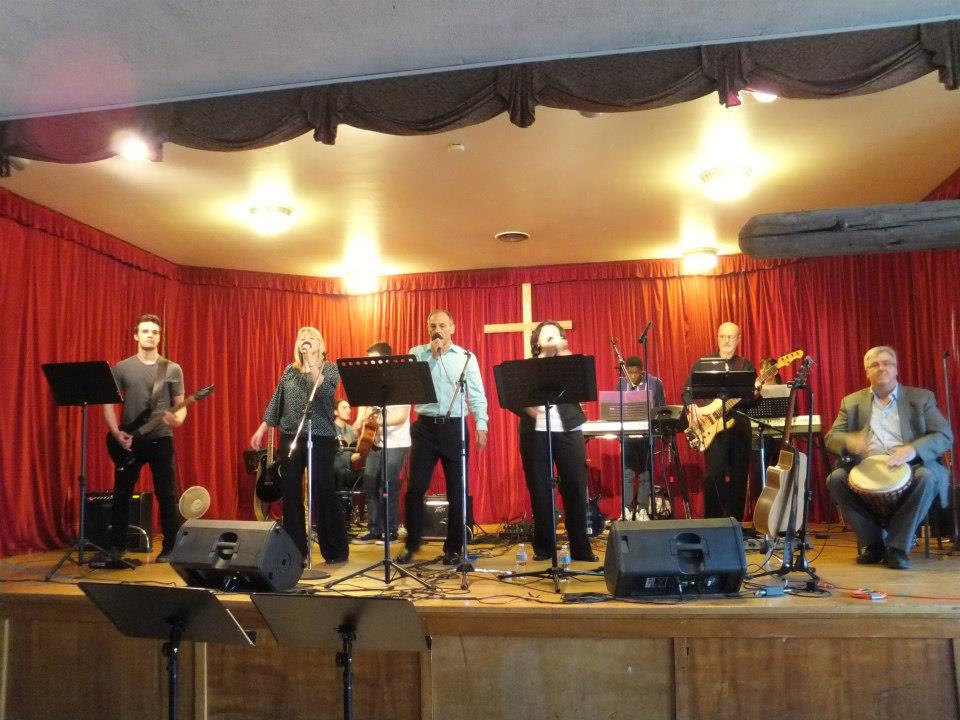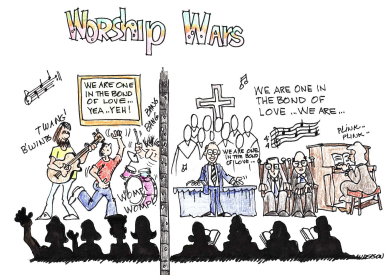This article is part five of a six-part series by Gary Deddo on interpreting Scripture. For part one, click here; for part two, click here; for part three, click here; for part four, click here.
Reality and the Meaning of Scripture
This next-to-last article in this series covers several more aspects of listening to, studying and interpreting Scripture that honors its God-given nature and purpose. As we examine these, perhaps we’ll find some bad habits that need to be unlearned.
Discovering the Meaning That Is There
Often when we hear Scripture read or preached or study it for ourselves, we approach it thinking we’re going to “try to make sense of it.” But I don’t think that’s really the best way to put it. Rather, we come to realize that as God speaks to us in Scripture it reads us, it makes sense of us! God’s Word sheds light on our lives. God’s Word is living and active and not a passive collection of data that we probe, organize, arrange and apply and then announce what we’ve made of it. Rather, as we listen to Scripture, we are acted upon by the Word and the Spirit. It comes with its own meaning and sense. So, we don’t give it meaning and make sense of it. We discover its meaning and sense.
Listening to and studying Scripture is a matter of discovery, not creativity, innovation or theorizing. So hearing Scripture in a way that fosters faith calls for a receptiveness on our part, allowing it to tell us. We do not sit in critical judgment upon it, deciding ahead of time what we will or won’t hear or whether we will or won’t live by it. St. Augustine long ago realized there was a huge difference in approaching Scripture as users compared to being receivers who are prepared to enjoy and live under the Word we hear. He advised, just like the book of James does, that we take the posture of hearers of the Word of God, receiving and even delighting in it.
Receptivity, the Proper Subjectivity
We don’t have to guess or sort through a lot of hypothetical options to discover what particular attitude of receptivity we should have towards God’s Word. First, Jesus, in his own responsiveness to his Father and the Spirit, demonstrates the proper personal and internal (subjective) orientation we are to have to the Word. Second, the apostles whom Jesus chose, including Paul, embodied the spirit of responsiveness that reflected Jesus’ own receptivity. These apostles were not chosen merely because they could be relied upon to convey accurate information (facts). They were appointed because they had the right kind of receptivity (subjective orientation) to the truth that they were given. If we are to hear the Word of God, we must stand in their place, taking up their attitude of receptivity. We have to have ears to hear in order to grasp what they are saying—to hear what they heard.
Often we think that the biblical revelation given to us by its authors is simply a collection of data, information that sits objectively there on the page, neutrally and in that sense objectively (we say). We then take over that “data,” mining it for ourselves with whatever subjective orientation we please, including the attempt to rid ourselves of any subjective element at all. But the biblical preservers of revelation do not simply offer objective information that we then decide how or whether to appropriate or receive. No, the biblical revelation includes the revelation of the nature of its own proper receptivity, its own orientation and attitude. And that subjective aspect is embodied in Jesus and his apostles and is also conveyed in their preserved writings. Revelation as revelation cannot be gained apart from this particular kind of receptivity because it is included in it.
And this subjective orientation is not neutral or abstractly objective. The receptive orientation of the biblical writers is one of trust, readiness to repent, a desire for reconciliation and confidence in the power and faithfulness of God to redeem, renew and put right all things. Revelation itself includes both objective and subjective elements perfectly coordinated with each other. How the revelation is received is perfectly harmonized with what is revealed. In fact, the revelation cannot be grasped at all except in and through that particular subjective orientation. God does not approach us neutrally, but passionately and redemptively. So we cannot approach God neutrally and dispassionately if we are to really receive the content and benefits of his revealed redemption. And that receptivity which is resident in Jesus and resonant in the apostles is given to us as a gift of the Spirit so that we might receive the revelation of God that the apostles of Jesus Christ passed on to the whole church for all time.
The False Objectivity of Abstract Thinking
So much of the information we get, some of which is called scientific, is abstract. It is disconnected from the source of the information, from the object being investigated. Such input can seem to be simply words, concepts, ideas, principles or numbers and mathematical formulas. Sometimes the information comes to us as a line of argument made up of a chain of logical connections. To use an analogy, it would be like studying the wake made by a boat that has long since passed by, but not learning much about the boat itself—which is really what we want to know. Such information rarely helps us relate to or interact with the object, the reality itself, since it’s only indirectly connected to it. We’re looking at the effects of something, not the source or cause of the effects.
Often in Christian teaching we’re led to consider evidences of something (the wake, the effects) but aren’t directed to think about the reality itself (the boat, cause or source of the effects). For example we might be presented evidences for the empty tomb, or for the possibility of Jesus’ miracles, but not give much consideration to Jesus himself. Following that path we may learn something about him, but we don’t get to know Jesus himself.
This rather abstract approach is often what we get from “experts.” Sometimes we are impressed by the knowledge and insight they impart. But at other times, their abstract information and principles annoy us and leave us cold. It can seem that such information has nothing practical to do with life. We suspect that what they are sharing is the product of overactive minds fueled by over-sized egos!
Though not always, this abstract approach is often characteristic of theological or philosophical thinking, which provides ideas or concepts about God. Doctrine then becomes a mere collection of ideas or concepts to believe in (or not!). This reduces Christianity to merely understanding Christian ideas—ideas undoubtedly derived from the Bible. But this abstracting and conceptualizing approach sets us up for the disaster that is common in modernity and postmodernity (two periods now existing side-by-side). The modern mindset tends to regard faith as bias that distorts any true knowledge of the reality. The postmodern mindset tends to see faith, like all forms of knowing, as governed by personal/subjective factors (such as race, gender, class, etc.). With this postmodern perspective, all knowing collapses into self-knowing, agnosticism or, more often, a knowledge controlled by the will-to-power.
A biblically-formed mindset acknowledges these barriers to knowing truth, including knowing God. From the biblical perspective, we fallen humans are seen as idolaters who create gods in our own image in order to justify ourselves and our own kind. The prophets of Israel spoke out against this idolatry, which is our attempt to recreate God in our own image or images that we can control and use. The golden calf in Moses’ time is an example. All of Scripture teaches that God cannot be found by sheer human effort and that we will only end up deluded by the results of such misguided efforts. Jesus declared, “No one knows the Son except the Father, and no one knows the Father except the Son” (Matthew 11:27). As the early church used to put it: “Only God knows God.” But that does not mean God cannot be known, for it does not rule out God’s being smart and motivated enough to figure out how to make himself known. So the early church saying went on: “And only God reveals God.” And that is what Jesus goes on to say, “…and those to whom the Son chooses to reveal him.”
The God of the Bible can and wants to make himself known. He’s the Good Shepherd who knows how to get through to the dumb sheep. God’s act of self-revelation is required if we are to know God himself, personally and deeply (epignosis is the Greek word used in the New Testament, parallel to Adam “knowing” his wife Eve).
Revelation, especially the self-revelation of God in Christ, that was borne witness to by Jesus’ personally selected apostles and the working of the Spirit, can’t be approached in either the modern or postmodern way, by either eliminating the subjective element or declaring that it always in every case hides or distorts the truth. Knowing God in his act of self-revelation calls for a particular subjective orientation that correlates with the nature and purpose of the revelation, namely being reconciled to God. It calls for humility and a mustard seed’s worth of faith/trust to get the ball rolling. We have to be willing to orient our ways of knowing, both its objective and subjective elements, to the nature of the revelation. Knowing God calls for a readiness to repent and a desire to be reconciled to God. God’s self-revelation rules out the twin errors of either attempting to remove all subjectivity (a false objectivity) or assuming that any subjective stance we might prefer would suffice (a false subjectivity).
Listening in this way to the Living Word through the Written Word by the Spirit puts us into contact with the reality itself, with the living God. In and through Scripture, with Christ at the center, we’re not being given information about God, but hearing a Word from God who makes himself known as Lord and Savior through the medium of those witnesses preserved for us. If we approach Scripture as simply a set of concepts, ideas or principles about God and his ways, we will be missing the boat! Scripture, by the Word and Spirit, does not primarily enable us to know about God or his will for us, but to know God, himself, in person. That is the case because God is a Living God and a speaking God and has not become mute since the days of Jesus. Listening to and studying Scripture with humility and trust/faith in the God of the Bible is a vital aspect of our living in actual relationship, communication, and communion with God. If we miss this we miss receiving the gift of God.
Taking the Bible Realistically
Now some in the church and its various seminaries have attempted to correct such an abstract approach to the Bible by emphasizing that we take the Bible “literally.” Their aim is to achieve a more “objective” approach. Others have recommended that we fix the problem on the subjective side of things by taking Scripture more seriously, more imaginatively, in a more narrative way. Or those seeing the problem on the subjective side might gravitate toward interpreting it more ethically (either personally or socio-politically), more pragmatically or with greater conviction, courage and commitment. While well-intentioned, these commendations seem to me to fall short of what is hoped for and don’t align as closely with the actual nature and character of God’s Word as we might think.
There are other theologians, most notably Thomas F. Torrance, who said what is needed is that we take the Bible realistically. When we listen to or study Scripture we are hearing from those who, by the inspiration of the Spirit of Jesus, are telling us about the reality of who God is and what God has done, is doing and will do. Scripture tells us about the nature of reality, reality we can have contact with and can access, for example creation, and also reality that we ourselves cannot directly access but that can contact us, e.g. the Living Word by the Spirit. The words of Scripture, then, point to, inform us and put us into contact with the reality of who God is and who we are in relationship to him and to creation. By them the Living God tells us what is the real situation. In listening to Scripture we are getting to know God himself because God is able to use, by the Spirit, the created medium of divinely appointed human communication to speak again to us through it. When interacting with Scripture, we’re dealing with the “boat” itself, not the wake it leaves behind.
So the question we ought to ask in reading any text of Scripture is this: “What reality is this passage telling me about?” This ought to be the central and controlling question whether it’s a historical event or a didactic teaching, a narrative or parable, a simile, a metaphor or symbol, a historical person or a hypothetical and representative character. Of every passage we need to ask these questions: What am I being told about the nature of reality, of God, of human nature, of our relationship with God, of right relationship with each other? Of course by “reality” we do not mean simply that which human creatures can see, taste, touch, measure, weigh and calculate. Those features only have to do with empirical realities, part of what we call nature considered as causal and mechanical and impersonal things. But Scripture puts us in touch with realities that cannot be investigated by empirical means. The most important reality is the nature, character and reality of God the Father and God the Holy Spirit and what he has done for us in Jesus. These are not natural or earthly realities at all. The Living and Speaking God continues to reveal the true nature of these realities through his Written Word with the Living Word as its center.
Faith Comes by Hearing
How do we discover these, to us, invisible realities if we can’t see them, touch them, weigh them or experiment with them? The answer is that we hear about them from reliable, personal sources or authorities. We encounter their objective reality through being told about them by those who know. We can know about things we cannot empirically explore by being told about them. By having ears to hear we can see with spiritual eyes (the eyes of our heart; Ephesians 1:18, Acts 26:18). Jesus’ eternal relationship with the Father and the Spirit is an example of such a reality. Other examples are the prophetic words from Jesus and his apostles about God’s future intentions for his creation, namely, that God will give us a renewed heavens and earth and that every tear will be wiped away by God’s final restorative working. By means of hearing from those who know, we can know and also interact with creaturely and divine realities that cannot be seen and cannot be empirically discovered. Speaking and hearing can be an objective event that conveys to us and thus puts us into contact with a divine transcendent reality. By the Spirit, this encounter corrects our wrong notions and arrogant attitudes. We can know, love, trust, obey and pray to God himself, who speaks an objective word to us in and through his Word.
So we listen to Scripture as a way of getting to know and interact with divine and creaturely reality, not just to have correct truths, ideas, concepts, ideals or doctrines. By hearing we come into contact with the truth and reality of who God is and who we are and discover the true nature of created things. Taking all of Scripture realistically tells us who and how things really were, are and will be.
The Meaning of Scripture
Another connection that probably needs to be made, although it perhaps sounds self-evident when articulated, is that what the Bible means is the reality to which it refers. The words of the Bible point beyond themselves by referring to and, by the Spirit, disclosing to us the reality itself, e.g. who God is. The words of the Bible have their significance (they signify or point to) actual realities. So when we take Holy Scripture realistically we are in fact asking after the meaning and significance of the words. The words don’t refer to or mean other words or ideas. The words refer beyond themselves and indicate realities that are far greater than the words themselves. The realities cannot be reduced to the words, but faithful and accurate words authorized by God through the Spirit can indeed put us in actual contact with the reality. We want to know what realities the words point to, for that reality is their meaning. We are not attempting to find or create or give meaning to Scripture or make the Bible meaningful to us or others. Rather, we’re discovering the meaning and significance it already has as we recognize the realities to which the words point and, by the Spirit, put us into contact with. That’s what God’s revelation intends to do and can do, that is its meaning.
Meaning Beyond the Words through the Words
An implication of Scripture’s meaning is that the fullness, meaning and significance of the reality exceed the words used to point to it. Even words that are indispensable for discovering and relating to the reality, like biblical revelation, can never substitute for the reality itself. The reality of God especially cannot be reduced to words, even biblical words. But those inspired words are not arbitrary or dispensable. They are the gift of God, the God-given means empowered by the Spirit to refer us to and reveal those realities. The Bible is like an absolutely unique and authoritative map that is essential to guiding us to our destination–which is not a point on the map itself, but an actual location in reality. So the meaning of the texts will always be found beyond the words themselves, although never discovered in any authoritative way except in and through the words spoken to us. That is why Scripture is indispensable to the Christian church, though we don’t worship the Bible. We don’t pray to the Bible and we don’t believe that the Bible will, on the last day, raise us from the dead. The object of our worship, love and faith is not the Bible, but the God who speaks to us uniquely through his written Word.
Our own words (in writing, preaching and teaching), including our doctrines, ought to be evaluated by how well they point to the same reality that Scripture itself points to. And we don’t want to be drawn into arguments about our words or those used by others. Rather, we listen for their meaning—the reality to which they point—realizing that words fall short of the transcendent and divine reality itself. We look for the most faithful words we can find, often with the help of others, in faith hoping to add our non-authoritative witness and testimony to the reality that the words of Scripture point to authoritatively.
These points about reality and the meaning of Scripture are large overarching concerns. But if Scripture is taken to offer simply concepts or ideas about God, or if we think our job is to make sense of it, or think the meaning of the words of Scripture are simply other words or ideas, we’ll go off in an unhelpful and confusing direction that will not easily contribute to our faith relationship with its Giver.
There are still a few more detailed, nitty-gritty suggestions we can touch on to wrap up this series of articles on listening to and studying Scripture. But we’ll wait to take them up in our last installment.









